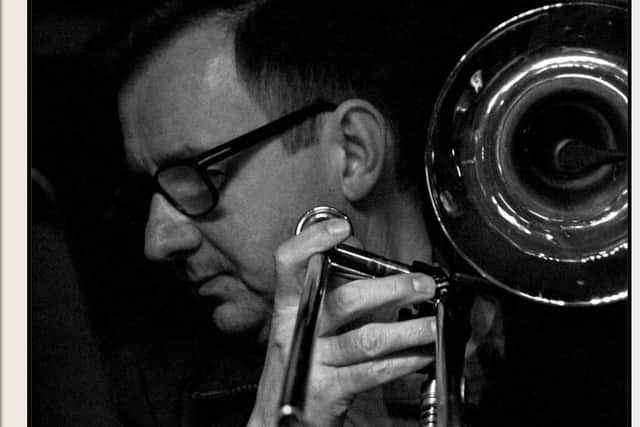Musician Willie calls for better rehabilitation for stroke survivors


The former music teacher has made huge strides in his recovery but says there is a lack of rehabilitation support within the Southern Health Trust.
Willie was a busy music teacher, performing musician and family man when stroke struck late one night in October 2017.
Advertisement
Hide AdAdvertisement
Hide AdHis speech returned after a few days but he was left with paralysis on the left side of his body and spent two months in hospital where he received physiotherapy and occupational therapy.


Willie said: “I remember the day the consultant stood at the end of my bed to tell me ‘Willie you might never walk another step again’. I just remember saying, that’s nonsense and I did it. I walked out of the Lurgan Stroke Unit. After that, everyday I’d try and walk another 10 steps more or walk to the next house along the street and just kept extending my goal each day.
“In the beginning, right after I’d been discharged from hospital, being cooped up at home was tough. I remember being offered medication for my mental health but I always said I’m not depressed or sad, I’ve just had a stroke. I had to wait nearly five months for any kind of emotional support. It was great when I got it but the wait was too long.
“When I came out of the hospital in December, I’d been told that I would receive regular physiotherapy immediately to make the most of the progress I had already made. But in the first few weeks I only saw therapists three or four times. I remember those days of being sat at home, unable to get out of the house, it was so frustrating for me. I was house bound and days would pass when no one would turn up. I just kept thinking - maybe tomorrow. I’m grateful to everyone who has helped me recover along the way but you can’t choose when stroke strikes and at that time, here where I live, the rehabilitation support was lacking”.
Advertisement
Hide AdAdvertisement
Hide Ad“After four months, I was told to prepare for the possibility that the movement in my arm would not come back but I refused to give up and so I’ve been paying for neuro-physiotherapy and swimming sessions.
“I’m so lucky to have music in my life. I involved my friends from the local music scene in holding two fundraising music concerts and raised an amazing £8k to help me pay for private therapy which is really working. I can now weight-bear on my arm and my strength and movement is improving all the time.
“Since my stroke, I’ve been determined that I will get better. I just need time and the access to the experts who can work with me to make it happen. I’m very proud of the achievements I’ve made, I just know that by staying positive and taking encouragement from each small improvement I’m going to get better.
“I just wish all stroke survivors were able to get the appropriate physical and emotional support they need to rebuild their lives no matter where they live or what their circumstances are.”
Advertisement
Hide AdAdvertisement
Hide AdBarry Macaulay, Director of the Stroke Association NI said: “Stroke turns lives upside down, robbing you of your mobility, your speech and often your independence. We know there are hospitals, stroke units and dedicated stroke professionals throughout NI providing excellent stroke rehabilitation.
“But there are still thousands of stroke survivors being let down by the health and social care system when they leave hospital. This is putting people’s recoveries at risk. Surviving a stroke is the first challenge; recovery is tough, but it’s only possible when stroke survivors can access the range of support services that they need, and deserve, to rebuild their lives.”
The Lived Experience of Stroke report also exposes the realities of living with stroke in NI:
Around a third (36%) of stroke survivors feel their support focused on their medical condition and not them as a person.
Advertisement
Hide AdAdvertisement
Hide AdHalf (50%) of stroke survivors who also had other health conditions, felt the support was more focused on their other conditions rather than the impact of their stroke.
Around a quarter (23%) said they didn’t receive enough practical support for things like driving after stroke.
Barry continued: “It takes a lot of effort and determination to keep going with rehabilitation after stroke but with the right specialist support, the brain can adapt. Even months and years after stroke, it’s possible to make a recovery.
“It’s important that everyone affected by stroke can access the support they so desperately need.”
Advertisement
Hide AdAdvertisement
Hide AdFor information call the Stroke Helpline (0303 3033 100) or visit www.stroke.org.uk/livedexperience
A Trust spokesperson said: “It is simply not possible nor appropriate for us to make any comment on the individual case highlighted in the Stroke Association’s press release.
“Our dedicated staff work hard to make sure people affected by stroke get the very best care and support to rebuild their lives.
“However, demands on health and social care resources increase every year, and we have to manage our available resources to meet the needs of the thousands of patients and clients we care for.
“If any patient believes we have failed to provide a high level of care and treatment, we do of course encourage them to make contact with us directly to discuss their case.”